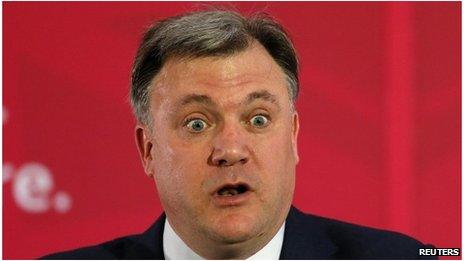Will the Budget scale back spending cuts?
- Published
- comments

In the light of Ed Balls's speech today, which claims that the Tories would cut public spending by a further £70bn if they were to win the general election, I need to slightly amend my judgement that next week's Budget is bound to be the dullest on record.
Because Balls's analysis has nudged me to remember that there is one big policy judgement that George Osborne and David Cameron have to make between now and Budget day on March 18 - which is whether to stick to the plan outlined in December's autumn statement to generate an overall budget surplus of £23.1bn in 2019-20.
Colossal sum
This really matters, because it is the Tories' pledge that they will stick to the "fiscal aggregates" of that Autumn Statement, which include that £23.1bn surplus, which means that the cuts they would have to make are so much bigger than a Labour government would have to do.
The point is that Labour has promised only to balance the current budget - ignoring investment - by the end of the next parliament.
That would give Labour £50bn more to spend than the Tories every year from then on - which is a colossal sum, equivalent to half the annual budget of NHS England.
But here is the thing.
The Tories' more general fiscal policy is to generate a budget surplus in all normal years. So in theory they could revise their fiscal plans for the next parliament and simply go for a miniscule surplus by 2019-20.
One consequence would be they would have to find £23bn less in cuts.
'Rule'
Even so, there would be a sizeable difference between the cuts the Tories would have to find and those required by a Labour government.
As a minimum, Labour would have £27bn odd more to spend every year than the Tories - because of its "rule" allowing it to borrow to finance investment.
In practice, given the prime minister's desire for personal tax cuts, a Tory government would probably have to find around £40bn more cuts than Labour.
And although cuts on that magnitude would not be painless or easy, the Institute for Fiscal Studies calculates that the current government has already announced and legislated for tax increases and cuts to welfare spending that should deliver a third of these savings.
Wiggle room?
To be clear, finding a bit less than £30bn of additional spending cuts, as a Tory government would have to do, would be challenging - in that departments have endured years of squeeze already, and welfare savings are notoriously hard to deliver.
But Ed Balls's central argument today that it would be completely impossible for a Tory government to protect health spending is probably not quite as watertight as he implies.